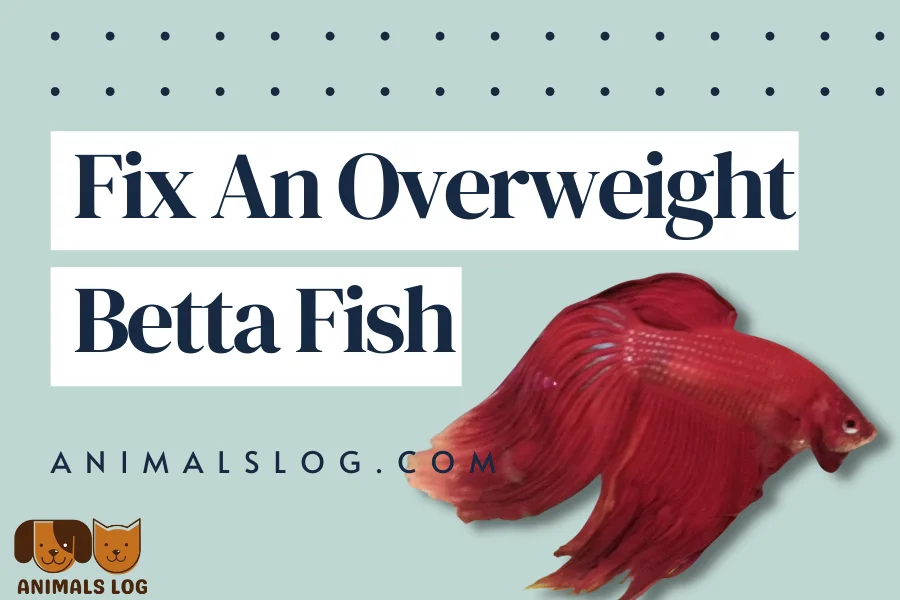Betta fish is perhaps the most attractive aquarium fish. However, like all living beings, a betta fish is also susceptible to being overfed. Overfeeding a betta fish may lead the betta to get bloated, resulting in an overweight betta fish.
It is quite logical that an overweight betta fish is caused due to the overfeeding of the betta fish. Betta fish are aggressive eaters and will eat anything presented in front of them, and that appeals to them. Thus, they are highly susceptible to being overfed. Sometimes an overweight betta fish may also be suffering from constipation. It is hard to measure the weight of a betta fish, so we need to look at the betta fish carefully to determine whether it is too fat or too skinny.
Identifying An Overweight Betta Fish
Before further discussing a betta fish that is overweight, we should first understand how an ideal betta fish looks like. Experts say that a perfectly fit betta fish must look like a streamlined torpedo from above, and the area behind the gill flaps or the operculum must have a constant width.
Any observation that is not as mentioned above may signify that your betta fish is unfit. For instance, if you see that the area behind the operculum of your betta fish is relatively thin, it may mean that your betta fish is underweight and can be considered too skinny.
On the other hand, if the area behind the operculum of your betta fish is relatively bulgier and bloated, it may be a sign that your betta fish is being overfed that has caused it to be overweight too fat. Thus, you can determine the fitness of your betta fish by just looking at its body carefully.
As stated earlier, an overweight betta fish is a result of overfeeding your betta fish. Similarly, an underweight betta fish is a result of underfeeding your betta fish. You should ensure that your betta fish gets all the necessary amounts of proteins and nutrients.
What To Feed A Betta Fish?

Before understanding how to fix an overweight betta fish, you first need to know about the dietary requirements of a betta fish. A betta fish is a born carnivorous. As betta fish follow a carnivorous diet, they generally need foods rich in proteins and have a meaty base.
An ideal betta fish diet consists of various combinations of foods that collectively contribute to the nutritional need of the betta fish. You can feed your betta fish quality betta flakes and betta pellets. Such betta pellets and betta flakes are the most feasible for a betta fish.
Betta pellets and betta flakes come in optimum sizes for a betta fish. Therefore, you will not need to cut or crush it into small pieces for your betta fish’s requirements. Moreover, betta pellets and betta flakes can easily be measured during the time of feeding and can be altered according to your discretion.
You can also feed your betta fish a combination of live and frozen foods that include bloodworms, earthworms, frozen brine shrimp, daphnia, and mosquito larvae. Providing such kind of food will add a natural element to your betta fish’s diet.
The only thing to remember while feeding live and frozen foods to your betta fish is that you should never feed such kinds of foods on a daily basis. These foods should only be given as a treat to your betta fish and should not be a part of your betta fish’s daily balanced diet.
You should feed live and frozen foods to your betta fish in moderation. It is recommended not to feed more than 3 to 4 betta pellets and flakes to your betta fish at a time. These betta pellets expand when they come in contact of water. Thus, it should not be overfed.
Live and frozen foods like brine shrimps, daphnia, and bloodworms should be given as an occasional treat only once or twice every week. Betta pellets and betta flakes must be fed once or twice every day according to your discretion. Moreover, follow the instructions given on the food package carefully before feeding.
Thus, an ideal betta fish diet consists of betta pellets, betta flakes, frozen brine shrimp, daphnia, bloodworms and earthworms, and mosquito larvae. These are easily available on Amazon or any nearby aquarium store. The only thing to take into consideration is trying not to overfeed your betta fish.
How To Fix An Underweight Or Overweight Betta Fish?

Having discussed the major factors contributing to an ideal betta fish diet, we can now discuss fixing an overweight betta fish. Well, the solution is quite evident and relatively easy to carry out. The only thing you need to do is monitor your betta fish’s food intake and change your diet accordingly.
A betta fish needs about 35% protein and about 5% fat in its diet. If the protein and fat intake of your betta fish exceeds this range, then it can lead your betta fish to become overweight. To fix an overweight betta fish, consider using another product brand to ensure a reduced supply of proteins or fats.
You can also try cutting down the amount of food you feed your betta fish at a particular time. For instance, you can cut down the number of pellets fed to your betta or try feeding the betta fish only once a day rather than twice. This will decrease the overall consumption of your betta fish.
Similarly, if your betta fish is underweight, try increasing the number of pellets or feeding it more frequently. You can also feed relatively more live foods to your betta fish during this time. However, remember to carry out this process gradually over a considerable period to avoid overfeeding.
FAQs on Overweight Betta Fish
Why is my betta fish chubby?
It may be because of you overfeeding your betta fish. Try reducing the amount of food given or the frequency of feeding to fix an overweight betta fish.
How do I make my betta fish fat?
You can try increasing the number of pellets you feed your betta fish. You can also try feeding live foods like brine shrimp, daphnia, and bloodworms more frequently.
How do I know if I am overfeeding my betta fish?
Some signs that you are overfeeding your betta fish.
– Betta fish appears bloaty and bulgy
– Betta pellets floating on the water surface
– Food leftovers at the bottom of the tank
– Reduced water pH level
– Substrate becomes dirty
– Water becomes cloudy
Final Thoughts
So, are you worried about your overweight betta fish? You need not panic as it is pretty simple to fix an overweight betta fish. You can adjust the amount of food you give or reduce the number of times you feed your betta fish.








